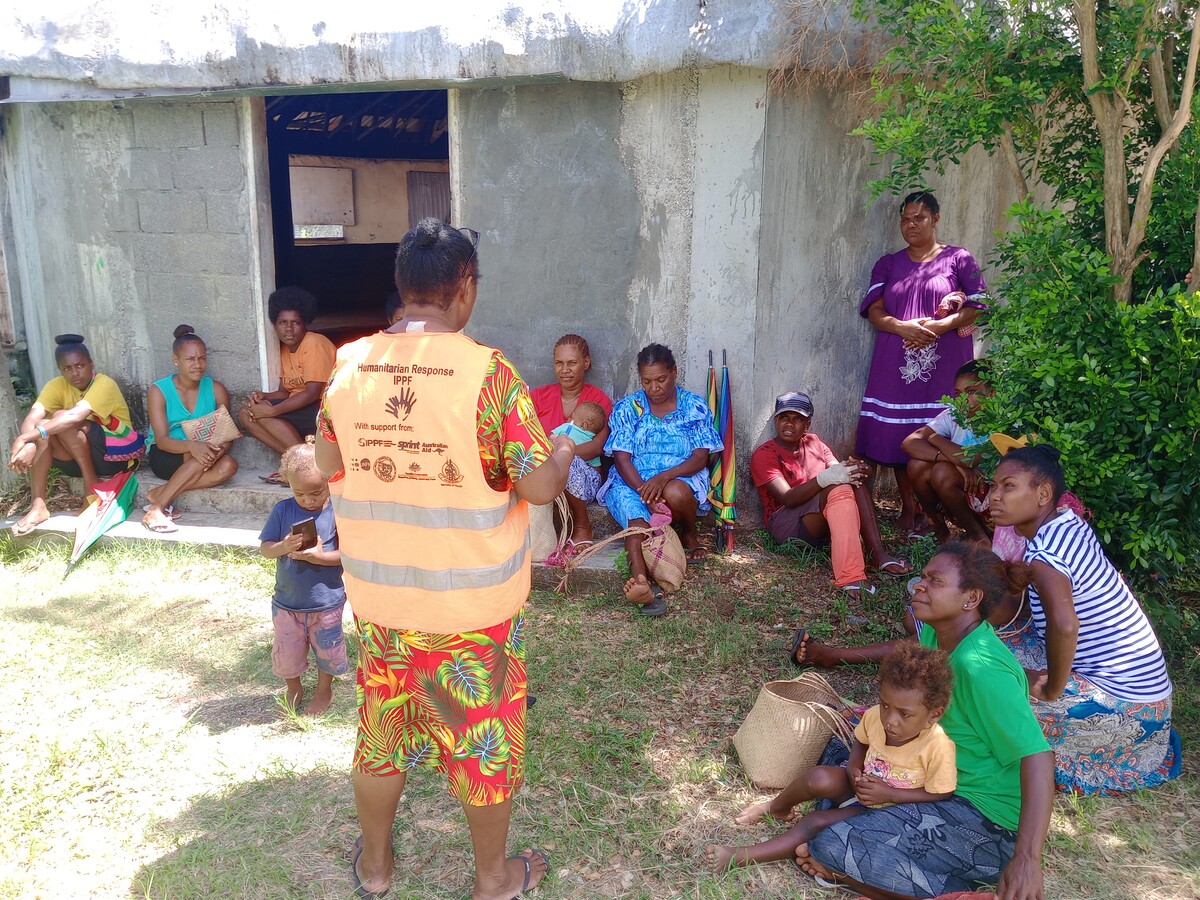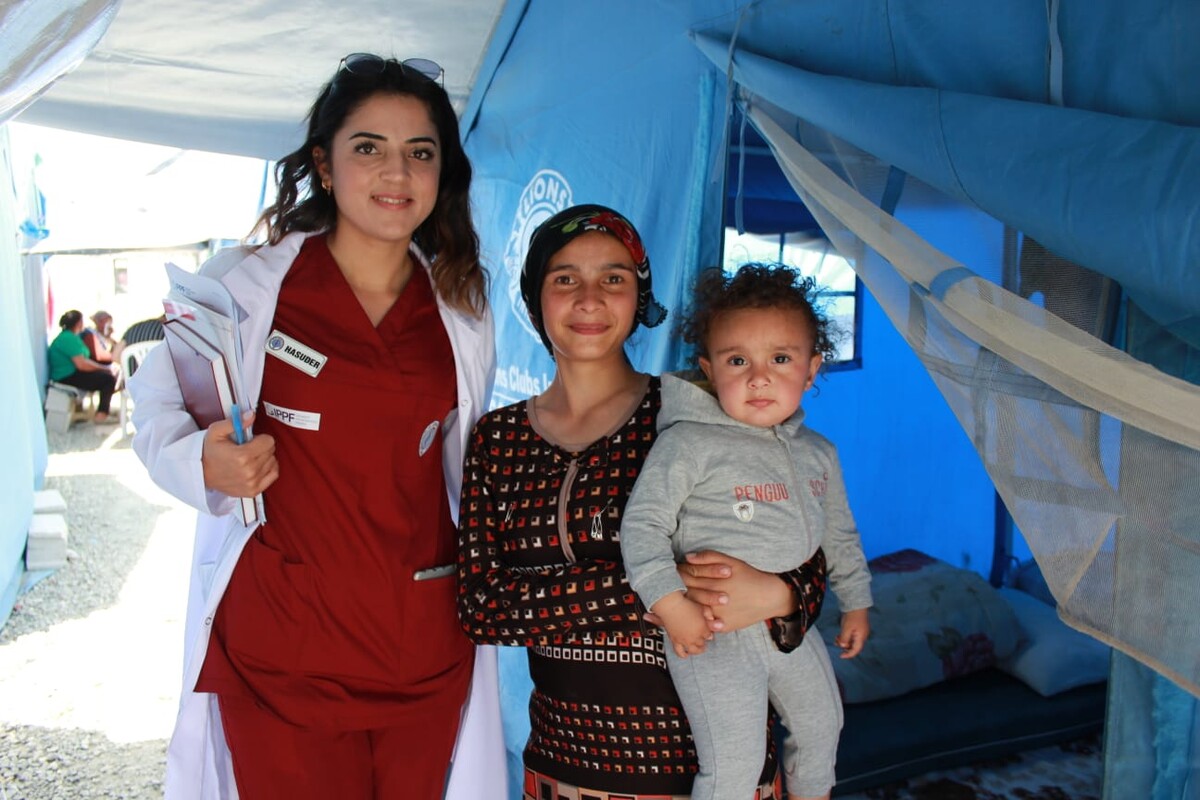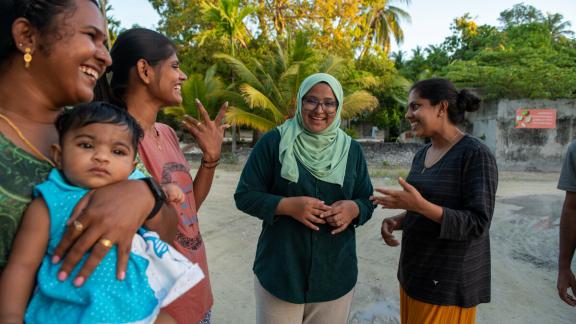This year has once again demonstrated IPPF's ability to respond to crises, to achieve policy change and to deliver sexual and reproductive health, rights and justice services thanks to the consistent, grassroots and community-based work of Member Associations. In 2024, we will continue this vital work, always with the people we serve at the center of our work.
In our work, we are constantly striving to advance human rights while at the same time preserving and protecting what we have already achieved. In this momentum, setbacks sometimes get most of our attention and we forget to celebrate our victories and the progress made.
As the year draws to a close, we have decided to take the time to highlight the defining moments of 2023 and celebrate the extraordinary work that members of the Federation and their partners do every day around the world.
Bridging the geographical divide by going mobile
In March 2023, Vanuatu was hit by tropical cyclones Kevin and Judy. Supported by the Australian Department of Foreign Affairs and Trade (DFAT), the Vanuatu Family Health Association (VFHA) led a humanitarian response to maintain community access to SRHR.
Moreover, they faced a geographical divide: hospitals are far away and costly to get to. “In our village, we have a lot of young single mothers and most of the time, trucks refuse to come up here because of the bad road. They must walk for two hours just to get to the main road, sometimes whilst pregnant, holding bags and their many children. This is why I invited VFHA to come here, so women don’t have to spend so much money and time just to get health services.” explains village spokesperson Jimmy. VFHA had successfully developed an outreach programme to visit remote communities.
The VFHA response team reached a total of 21 communities and more than 3,000 beneficiaries across Tafea Province. This included mobile outreach to 15 communities on Tanna Island, three communities on Futuna and three communities in Aneityum.
Credit: IPPF/Rupeni Vatubuli/Vanuatu

The Cook Islands decriminalizes homosexuality
Since 2017, the Cook Islands Family Welfare Association (CIFWA), along with Pride Cook Islands and Te Tiare Association (TTA), two of the largest LGBTI+ advocacy organisations in the country, have been leading a movement to decriminalise homosexuality and amend the Crimes Act 1969.
In April 2023, Parliament voted in favour of The Crimes (Sexual Offences) Amendment Bill 2023, decriminalising homosexuality. “On behalf of Pride Cook Islands, we congratulate our Prime Minister and his government for doing the right thing – Love is Love! Te Iti Tangata, hug the ones you love, and now you can tell them they belong. We are one.” stated Pride Cook Islands president Karla Eggelton.
Credit: IPPF/Hannah Maule-ffinch/Cook Islands

Contraceptive Care for Earthquake Survivors
In the aftermath of the earthquake in Turkey, the population in the affected areas was relocated to internally displaced persons (IDP) camps. IPPF estimates that 3.9 million women of reproductive age, more than 175,000 pregnant women and more than 1.2 million adolescent girls (aged 10 to 19 years) have been affected by the disaster. Over 8,700 pregnant women are expected to suffer complications during childbirth. IPPF’s local partner, the Association of Public Health Specialists (HASUDER) has been working in camps to maintain access to sexual and reproductive rights and services such as maternal and neonatal care, safe abortion care, and counseling for sexual and gender-based violence. HASUDER is the only contraceptive provider in the camps.
Nineteen-year-old Khadijah* came to HASUDER's Women and Reproductive Health Service Unit for contraceptive advice. She got married at 16 and is the mother of a two-year-old son. She is thinking about getting pregnant again, but would like to wait until her child is a little bit older.
“I didn't know about birth control pills before. Here, I learned how to use them. My husband was using a condom but I bought it here for the first time. My husband is not against birth control, but he doesn't want me to take the pill because he has prejudices. I told him what I learned here, I told him that it is healthier."
*Names changed
Credit: HASUDER/2023

Mexico decriminalizes abortion
Mexico's Supreme Court has ruled that it is unconstitutional for the federal government to criminalize abortion. This decision is the result of the tremendous work led by abortion rights advocates. The unstoppable Green Wave movement has won another victory.
“Criminalization of abortion constitutes an act of gender-based violence and discrimination, as it perpetuates the stereotype that women and people with the capacity to get pregnant can only freely exercise their sexuality to procreate and reinforces the gender role that imposes motherhood as a compulsory destiny.” stated the Mexican Supreme Court in its public statement.
Credit: Alejandro_Munoz

South Sudan growing community acceptance of modern family planning methods
In South Sudan, IPPF leads the WISH2ACTION programme, funded by the UK's Foreign, Commonwealth & Development Office (FCDO). Alongside a consortium of three organizations, IPPF has been working to provide sexual and reproductive services and promote the family planning agenda. Collectively, they support the government's efforts to ensure people's access to their rights.
As a result of this collaborative work, mindsets are gradually changing in favor of modern family planning methods in South Sudan. According to surveys conducted by the independent agency GENESIS, between 2020 and 2022, the community acceptance of modern family planning methods rose from 29% to 89% in the region of the Northern Bahr el Ghazal & Unity. More women are adopting Long Acting and Reversible Contraceptives (LARCs). Overall, the number of family planning clients continue to grow.
The primary driver for this change is the economic challenge of meeting the cost of living, particularly while raising multiple children. Community members shared their desire to meet their children's needs and prioritize their education.
“If positive trends continue, South Sudan stands to witness improvements in reproductive health indicators, making it imperative to maintain and expand existing programmes such as WISH2ACTION to optimize the benefits of prior investments.” says Dr Elias Garma who has worked in both humanitarian and development settings in South Sudan.
Credit: Adriana Mahdalova

One step closer to constitutionalizing the right to abortion
In response to the US Supreme Court's overturning of Roe v Wade, French feminist organizations, led by Le Planning familial, have launched a movement for the constitutionalisation of abortion rights. On International Women's Day, President Emmanuel Macron made a first official statement that he would lead a constitutional reform and include abortion rights. A few months later, in October, he promised to enshrine women's right to abortion in the French constitution by 2024. Since then, feminist organizations have kept the government under pressure to push through this constitutional reform.
“Feminists around the world are looking to France, which would be the first country to institutionalize the right to abortion. That would be a very important sounding board, it would show that it's possible.” explains Sarah Durocher, President of Le Planning familial in France in an interview.
“France is one step closer to become the first country in the world to enshrine the right to abortion in its Constitution,” said Dr Alvaro Bermejo, Director-General of IPPF in a video following the announcement.
Credit: Nanohana/Cece Hristova

Reforming our SRHR legal system
Spain adopted a sexual and reproductive health and rights reform which addresses several issues. It has made access to abortion easier. For instance, 16- and 17-year-old girls can access abortion without parental consent and the three-day waiting period has been abolished. The reform provided free sanitary pads in prisons and women's centers and free hormonal contraceptives and the morning-after pill in government health centers. Thanks to the new law, workers suffering severe period pain can take a menstrual leave. Finally, the reform allows any citizen over the age of 16 to change their legally registered gender without medical supervision.
“This new legislation is the result of determined efforts from feminist movements and health professionals. It is also in line with public opinion in Spain: abortion is healthcare. We welcome these progressive changes and stand ready to ensure it is applied and will materialize in national strategies and in the allocation of resources”, said Filomena Ruggiero from SEDRA.
Credit: David MG

Portugal: a constitutional statement in favor of sex workers rights
In Portugal, the Penal Code does not criminalise sex work. However, it is illegal for third parties to profit from, encourage, support or assist prostitution. This law was intended to ban brothels and pimping. As a result, sex workers cannot work together or in collective settings. Organizations have been campaigning to change this law to improve the working conditions of sex workers. In May, the Constitutional Court ruled that it was unconstitutional to criminalize all third parties without distinguishing between exploitative and non-exploitative ones. What a victory for the Associação Para O Planeamento Da Família (APF), IPPF Portugese Member Association, which has been advocating for the rights of sex workers for more than 25 years.. The organization celebrated the victory, but pointed out that many difficulties remain.
Alexandra Ramos, APF member who works at Espaço Pessoa – a service providing care to sex workers and people who use drugs, explains: “People are socially isolated, and many of them move from city to city, and room to room, without creating any links outside of the local bus station or airport. Opportunities to establish social support networks are increasingly few, particularly outside of the sex work circuit. Homelessness has also become an increasingly big problem with rent hikes making access to housing a massive barrier.”
Since 1997, APF has been committed to supporting the sex worker community. Through their community centers, their team builds a relationship of trust with people. They provide sexual and reproductive health and rights services as well as psychological and social support. APF aims to remove the stigma associated with sex work and to empower the community by enabling them to know their rights.
Credit: IPPF EN/Jon Spaull

Kenyan Supreme Court overruled discriminatory government decision
The Kenyan LGBTIQ+ community celebrated a great victory this year. The government was refusing to register a LGBTIQ+ organization. The Supreme Court opposed the governmental decision and stated: “The court was of the view that the [government’s] decision was discriminatory and that it would be unconstitutional to limit the right to associate, through denial of registration of an association, purely on the basis of the sexual orientation of the applicants, [...]. Human rights are inherent and held simply because of being a human. All human beings, including LGBTIQ persons, are entitled to the full enjoyment of all the rights under chapter four of the constitution, not by reason of their sexual preferences as LGBTIQ but as human beings. Just as the rights enjoyed by heterosexuals are not based on their sexual orientation but by virtue of common humanity.”.
This statement faced strong religious and political opposition. Same-sex unions are illegal in Kenya, but that did not stop the Supreme Court from declaring the government's decision discriminatory. It is a victory for LGBTIQ+ organizations and their allies.
Credit: Fahe Kerubo/Kenya

when








